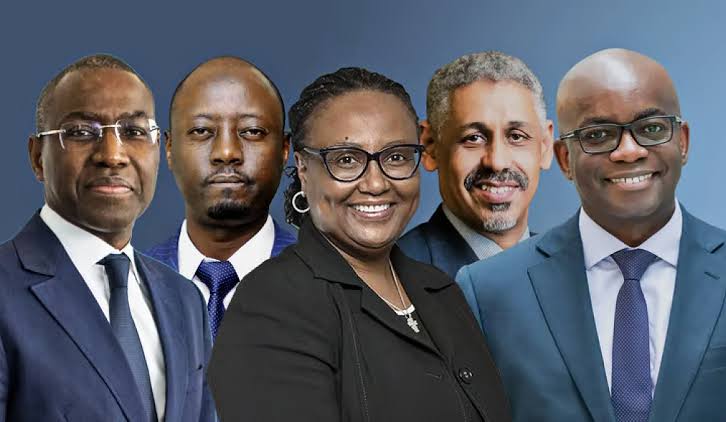Five contenders are vying to lead the African Development Bank (AfDB), with the presidential election set to take place this Thursday during the institution’s annual meeting in Abidjan. At a time when Africa’s development financing is under pressure from global economic shifts, the outcome could reshape the continent’s approach to infrastructure, trade, and financial independence.
The AfDB’s $318 billion capital base is emerging as a critical lifeline as concessional funding dwindles, donor support contracts, and borrowing costs climb. Against this backdrop, the candidates are laying out bold agendas to strengthen the bank’s impact across Africa’s 54 nations.
Swazi Tshabalala Bajabulile: Rewiring AfDB for Infrastructure Delivery
South African banker Swazi Tshabalala, the only woman in the race and a former senior vice president at AfDB, is calling for a structural overhaul of the bank itself. She argues that the current setup does not support sustained focus on transformational sectors like infrastructure.
“If we align the institution properly, infrastructure can become a true engine for unlocking Africa’s vast potential—from minerals to financial innovation,” Tshabalala said. She aims to expand the bank’s use of hybrid capital to introduce more innovative financial tools and unlock large-scale development.
Amadou Hott: Mobilising Africa’s Own Wealth
Former Senegalese economy minister Amadou Hott believes Africa must harness its own resources more effectively. With a background spanning major financial hubs including Lagos and London, Hott is prioritising domestic revenue mobilisation and private sector engagement.
“Revenue collection is the foundation,” he said, pointing to Africa’s average tax-to-GDP ratio of just 16%, compared to 34% in OECD nations. Better tax systems, he argues, would strengthen credit ratings and attract affordable capital for critical infrastructure.
Hott also sees a gap in well-prepared, risk-mitigated projects. “The money is there. What’s missing are bankable, investment-ready initiatives,” he added.
Samuel Munzele Maimbo: Fixing Africa’s Financial Plumbing
Zambian development finance expert Samuel Maimbo, currently a vice president at the World Bank, is focusing on boosting intra-African trade by improving regulatory coherence and financial integration.
“Our trade with each other is just 15%—that’s unacceptable,” he said. Maimbo wants the AfDB to lead efforts to harmonise financial regulations, enhance data systems, and build mechanisms that allow African nations to trade and invest among themselves. His campaign is backed by the Southern African Development Community and the Common Market for Eastern and Southern Africa.
Sidi Ould Tah: A Push for Economic Sovereignty
Mauritania’s Sidi Ould Tah, head of the Arab Bank for Economic Development in Africa, is calling for the AfDB to move beyond outdated constraints and become a champion of African economic self-determination.
His four-pronged agenda includes diversifying capital sources, reforming financial systems, formalising the informal sector—where over 80% of Africans work—and investing in climate-resilient infrastructure.
“With the right partnerships, every dollar raised by AfDB could mobilise ten in return,” he said, highlighting collaboration with private investors, regional banks, and global institutions.
Abbas Mahamat Tolli: Reforming Governance for Sustainable Growth
Veteran Central African economist Abbas Mahamat Tolli draws from experience as Chad’s finance minister and head of the regional central bank. He is campaigning on a platform of fiscal discipline, self-sufficiency, and structural reform.
Tolli proposes tightening governance to curb waste and financial outflows caused by mismanagement and tax evasion. “Better control of resources is essential if we want real development,” he said.
His vision includes digitising the bank’s financing channels, strengthening public-private partnerships, and introducing risk-pooling strategies to boost efficiency. Reflecting on his upbringing as a child refugee who tended goats during Chad’s civil war, Tolli says he carries with him the lived experience of Africa’s challenges—and its resilience.
What’s at Stake
As the global economic order shifts, the role of the African Development Bank has become even more central to the continent’s trajectory. Whichever candidate prevails will be tasked with steering the bank through a period of financial uncertainty and developmental urgency—while ensuring that Africa’s voice remains strong and united on the world stage.



